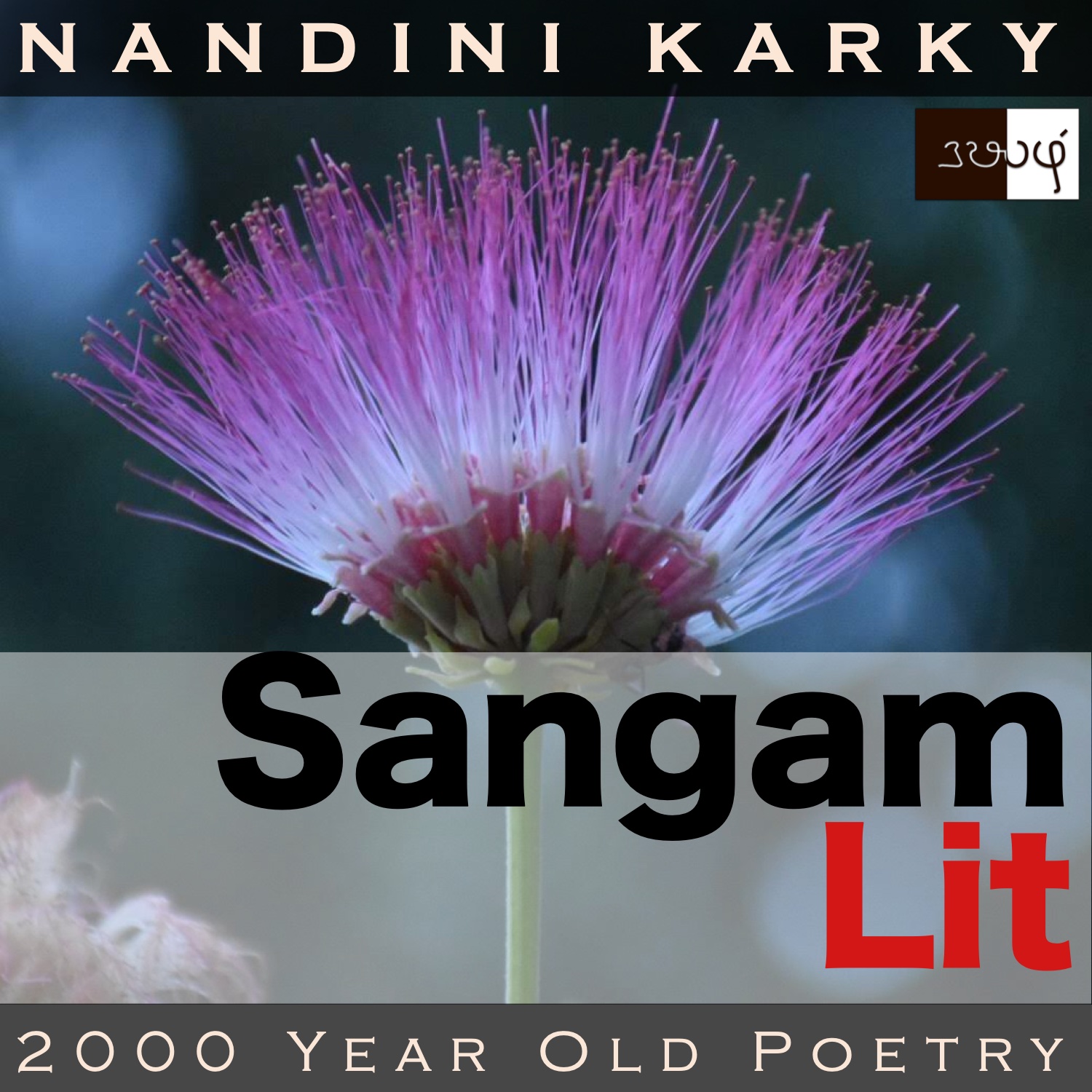Podcast: Play in new window | Download
Subscribe: Apple Podcasts | Spotify | Amazon Music | Android | iHeartRadio | Email | TuneIn | RSS | More

In this episode, we relish a picturesque comparison between plant and animal life, as portrayed in Sangam Literary work, Kurunthogai 347, penned by Kaaviripoompattinathu Chentham Kannanaar. Set in the drylands of ‘Paalai’, the verse speaks in the voice of the man to his heart, expressing his inability to part with the lady.
மல்கு சுனை உலர்ந்த நல்கூர் சுரமுதல்
குமரி வாகைக் கோலுடை நறு வீ
மட மாத் தோகைக் குடுமியின் தோன்றும்
கான நீள் இடை, தானும் நம்மொடு
ஒன்று மணம் செய்தனள் இவள் எனின்,
நன்றே-நெஞ்சம்!-நயந்த நின் துணிவே.
‘If that could happen, then, what you say, would be good’ is the logical core of this verse. The opening words ‘மல்கு சுனை உலர்ந்த நல்கூர் சுரமுதல்’ meaning ‘ponds overflowing with water have dried up in the struggling drylands’ inform us that this geographical region has a temporary aspect to it. This means that the ‘Paalai’ region or drylands is not a constant feature of the land like the other ‘Kurinji’, ‘Neythal’, ‘Mullai’ and ‘Marutham’ regions, but implies that any of the above regions can turn into the mentioned wastelands without rain and water. Returning, next we glance at ‘குமரி வாகைக் கோலுடை நறு வீ’ meaning ‘the sweet-smelling flowers of the young lebbek tree, having long stalks’. Incidentally, this ‘vaagai’ tree has curious names in other countries such as ‘shak shak tree’ and ‘woman’s tongue tree’! Turning to the fauna, we take in ‘மட மாத் தோகை’ meaning ‘naive and huge plume of feathers’ in a literal sense, implying that this phrase is talking about a peahen. Ending with the words ‘நயந்த நின் துணிவே’ meaning ‘what you wish and dare me to do’, the verse intrigues our curiosity.
What could be that one thing the man puts forth as a condition? The context reveals that the man and lady were leading a happy, married life, when the man felt the need to part with the lady to gather wealth. At this time, the man turns to his heart and says, “In the drylands, where springs, once brimming with water, have now dried up, the young ‘vaagai’ tree’s long-stalked, fragrant flowers appear akin to a naive huge-feathered peahen’s tuft in the long and winding paths of the dry jungle. If she allows herself to come along as one with us, then, my dear heart, what you dare and desire would be good!” With these words, the man indirectly declares to his heart that he prefers to remain with the lady, and not go in search of wealth, at the moment.
It’s time to take a slow and meditative walk on that drylands path and listen closely to the man’s words. He starts by talking about how not long before, the springs there were full of water, but now, it’s barren and in such a bleak landscape, a young ‘vaagai’ tree seemed to be struggling to thrive. Although it struggles to even live, it’s determined to fulfil its purpose in life, which is to spread its progeny, and thus, puts out its flowers. The man zooms on to one of its flowers and points to how the petals of that fragrant flower are standing atop long and thin stalks, and this, he compares with the tuft of a naive peahen. If you take a moment to search and place side by side, a lebbeck tree flower and a peahen’s tuft, you will be stunned by the similarity of the two. What phenomenal attention and creativity would it take to connect two such disparate elements into a single thought! Looking at it philosophically, it’s yet another shout-out for the oneness of all life that throbs on this earth.
Returning to the verse, we find the man concluding the description of the drylands path thus, and saying to his heart, that if at all the lady agreed to come along in their journey, then whatever the heart wishes for, would be good. To see what this means, we have to understand that it was not an accepted practice for married women to accompany the men on their missions in Sangam times. So, the man is indirectly telling his heart, what you wish for, which is, for me to part with her and travel in search of wealth, will not happen. Herein lies that unique way of conveying a decision to oneself! If you think about it, the man’s heart is indeed a part of him and what he wants is what his heart wants! So, why does the man separate himself from his heart? What good could it do? Why don’t we try this technique in our own lives and find out? The next time you feel a nudge in your heart to do something that has a lot of consequences, why not treat your heart as another person and see if that would pave a better path to clarity?




Share your thoughts...